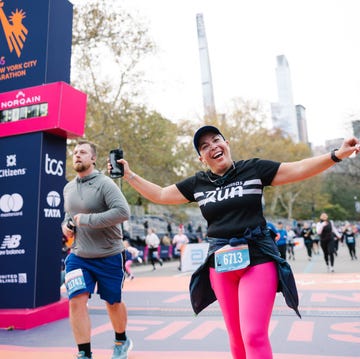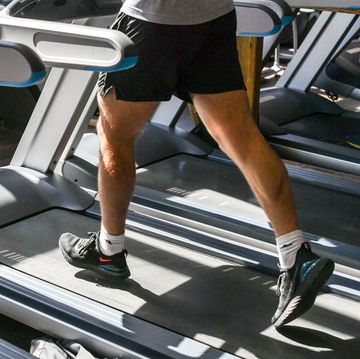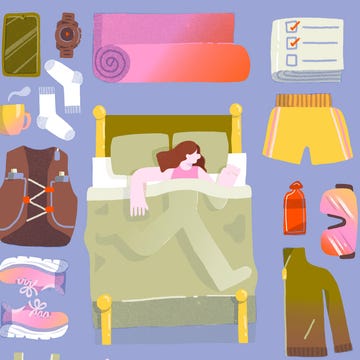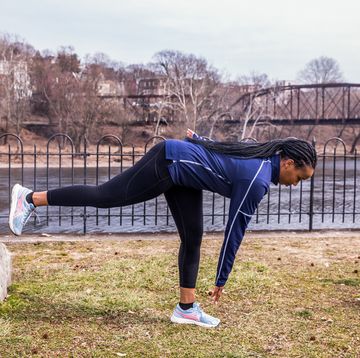It's 6 a.m. You're just coming to terms with the fact that your alarm went off, and though you're still groggy, your mind manages to race through all the reasons why you should just roll over and go back to sleep. But, wait! Out of the fog, you remember there is a running buddy waiting for you. And with that, you roll out of bed, lace up your shoes, and head out the door.
Training partners are one of the most valuable tools a runner can have, says Andrew Allden, who coaches women's cross-country at the University of South Carolina. "They make you accountable, so you're more likely to show up and give 100 percent during your workout because you know that someone else is counting on you."
But in order for you to get the most out of the relationship, there are several important factors to consider. This advice will help you pick—and be—an awesome running buddy.
Have a Few
An exclusive running partner is great—until he's injured or goes on vacation, and you're suddenly a solo act. That's why having multiple training buddies or joining a group is smart. If your go-to companion catches a stomach bug and can't manage a 20-miler, you'll have other runners in your circle to rely on, says Allden. Also, having partners of varying abilities can help meet your training goals. You might have one chatty partner whose company you really enjoy on slower-paced long runs. But for speedwork, hooking up with someone who is more performance-focused (i.e., talks less and sweats more) can help you push harder and have a stronger workout, says Allden.
Befriend a Faster Runner
Muster up the courage to approach the guy or gal who's always slightly ahead of you in your club run. Or the one who consistently passes you in the final miles of a race running strong as you're running out of steam. "Go introduce yourself and ask, 'Do you mind if I tag along for one of your workouts?'" says running coach Tim Broe, program director for Team Michigan Elite. "Finding those people who are slightly better than you or who appear to have an edge over you can help you improve."
Even if you don't keep up with him stride for stride, having someone to chase or keep in your sights for a run can be enough to help you climb out of a training rut. Going for a postrun coffee together could be just as valuable—it will give you a chance to pick his brain and find out everything from what his key workouts are to how he managed to beat calf cramps or avoid bonking.
Sync Schedules
Sure, someone training for a marathon is going to have compatibility issues with someone focused on 5-Ks. Just as someone who run/walks 11-minute miles isn't going to last very long with someone who averages a seven-minute mile. But that doesn't mean these Oscars and Felixes can't ever run together. An easy four-miler for one runner can be a challenging tempo run for another, if you mesh your schedules accordingly, says Broe.
Pace and distance aren't the only areas of compatibility. Personality and temperament are just as important, says Cindra Kamphoff, Ph.D., who is director of the Center for Sport and Performance Psychology at Minnesota State University and also a marathoner. If you like to train outdoors year round, but your partner bolts for the treadmill every time it drizzles, you should be aware of that, especially if you're looking for a buddy who's going to be game for training through the cold of winter or the heat of summer. The same goes for schedules. If your idea of an early run is 6 a.m. and his is 9 a.m., he may hit the snooze button more than he hits the road with you.
Positive attitudes also matter. "The last thing you want is someone complaining about the weather or how early it is or how hard the workout is," says Allden. "The negativity rubs off on you. I call it the 'complaint bandwagon.' You need someone who has the attitude, 'This is a training day, and I'm here, ready to go.'"
Find Equal Footing
There is a difference between a running partner and a coach. Unless your buddy picks you for your experienced wisdom and specifically asks for your insight, it's important to recognize your role as his peer, not his trainer. Recent research from Kansas State University and Michigan State University revealed runners who were paired with someone slightly more skilled and who didn't receive verbal encouragement ("You can do it!") actually went longer and harder than those who did. The suspected reason? Researchers believe that such cheerleading, while well intentioned, can seem condescending.
That's not to say you can't ever dole out a verbal pat on the back, since such motivation is one of the reasons runners pair up in the first place. "You just don't want it to come across that you always have the answer or that you are always critiquing your buddy," Kamphoff says. "Constant criticism can brew resentment."
Delivery matters, too. If you're usually in front on runs and want to offer a word of encouragement, circle around to her side. "Shouting over your shoulder adds insult to injury," says New York City-based trainer Larysa DiDio, who works with elite and Olympic athletes. Likewise, DiDio encourages people to think about the wording of any social-media posts. "A link to an upcoming race you want to do with your partner with a 'Let's do this!' comment is fine," she says. "But that same link with 'I know you can do this!' has a different tone. It's better for your partner to feel like you're in the same boat."













